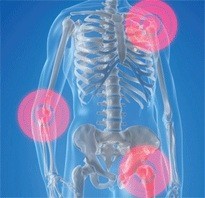Latin America has a significantly lower gross domestic product (GDP) compared to Canada, Europe and the US. Despite this fact, the cost of biologicals is in general very similar to countries with higher GDP, causing problems for patients to gain access to these medications. This problem could possibly be solved by the introduction of lower-cost biosimilars to the region.
Use of similar biotherapeutic products to treat rheumatoid arthritis in Latin America
Biosimilars/Research
|
Posted 08/11/2013
 0
Post your comment
0
Post your comment

Once diagnosed with rheumatoid arthritis, at-risk patients can be treated with disease-modifying antirheumatic drugs (DMARDs) with or without biologicals with the goal of achieving disease remission and avoiding structural damage. While these goals and strategies have already been launched in Canada, the European Union, and the United States, less progress has been achieved in Latin America.
In 2009, the Latin American Rheumatology Associations of the Pan-American League of Associations for Rheumatology (PANLAR) and the Grupo Latino Americano de Estudio de Artritis Reumatoide (GLADAR) established criteria for using biological agents in rheumatoid arthritis patients who were unresponsive to DMARDs [1].
Biologicals used in Latin America for the treatment of rheumatoid arthritis include the tumour necrosis factor (TNF)-α inhibitors (etanercept, infliximab and adalimumab), B‑cell depletion agent (rituximab), interleukin-6 receptor blocker (tocilizumab) and T‑cell co-stimulatory blocker (abatacept). Future therapies include kinase inhibitors (tofacitinib and fostamatinib), alternative TNF-α inhibitors (golimumab and certolizumab) and biosimilars.
The only problem is that originator biologicals are expensive and reimbursement in Latin America is very limited and is only available in some countries. However, early treatment of rheumatoid arthritis translates into substantial reductions in the cost to society and should therefore be considered in the cash-strapped economies of Latin America. One way to go about this would be to introduce lower cost biosimilars as an alternative to the expensive originator treatments. Although the development of biosimilars is expensive, an estimated 30% of costs can be saved on current patented biologicals.
Similar biotherapeutic products already on the market in Latin America include an etanercept biosimilar, Etanar, for the treatment of inflammatory diseases, which is available in Colombia, although regulations for the approval of biosimilars in the country are still under development. Reditux/Tidecron, a rituximab biosimilar* produced by Dr Reddy’s Laboratories, is marketed in Bolivia, Chile, Ecuador, Paraguay and Peru. In addition, Kikuzubam, produced by Probiomed, has become available in Mexico [2]. Other similar biotherapeutic products under development for marketing in Latin America include bevacizumab, infliximab and trastuzumab [3].
The challenge for Latin American countries, as in other parts of the world, in the treatment of rheumatoid arthritis is to make rheumatoid arthritis a public health priority, knowing its socio-economic impact in terms of its high cost and burden on the healthcare system, as well as to increase access to prompt diagnosis, treatment by rheumatologists and to increase the availability of effective low cost medications.
Conflict of interest
The authors of the research paper [1] reported the following conflict of interest:
Rubén Burgos Vargas has participated on advisory boards for Abbott, BMS, Janssen, Pfizer, and Roche, and as a speaker for Abbott, Bristol Myers Squibb, Janssen, Pfizer, and Roche. Kasmir Ostojich was a Regional Medical Director of Medical Affairs for Pfizer, Inflammation during the development of the manuscript. Mario H Cardiel is a clinical researcher who has conducted clinical trials for Pfizer, Roche, Bristol Myers Squibb, La Jolla Pharmaceutical, Anthera, Astra Zeneca, Chelsea. He has been a speaker and consultant for Pfizer, Bristol Myers Squibb, Abbott and Merck.
Editor’s comment
*It should be noted that similar biotherapeutic products approved in Latin American countries might not have been authorized following as strict a regulatory process as is required for approval of biosimilars in the EU. EMA regulatory requirements ensure the same high standards of quality, safety and efficacy for biosimilars as for originator biologicals, and also include a rigorous comparability exercise with the reference product.
If you are interested in contributing a research paper in a similar area to GaBI Journal, please send us your submission here.
Related article
Regulation of similar biotherapeutic products in Latin America
References
1. Burgos-Vargas R, Catoggio LJ, Galarza-Maldonado C, Ostojich K, Cardiel MH. Current therapies in rheumatoid arthritis: a Latin American perspective. Reumatol Clin. 2013;9(2):106-12.
2. GaBI Online - Generics and Biosimilars Initiative. Similar biotherapeutic products approved and marketed in Latin America [www.gabionline.net]. Mol, Belgium: Pro Pharma Communications International; [cited 2013 Nov 8]. Available from: www.gabionline.net/Biosimilars/General/Similar-biotherapeutic-products-approved-and-marketed-in-Latin-America
3. GaBI Online - Generics and Biosimilars Initiative. Similar biotherapeutic products under development in Latin America [www.gabionline.net]. Mol, Belgium: Pro Pharma Communications International; [cited 2013 Nov 8]. Available from: www.gabionline.net/Biosimilars/General/Similar-biotherapeutic-products-under-development-in-Latin-America
Permission granted to reproduce for personal and non-commercial use only. All other reproduction, copy or reprinting of all or part of any ‘Content’ found on this website is strictly prohibited without the prior consent of the publisher. Contact the publisher to obtain permission before redistributing.
Copyright – Unless otherwise stated all contents of this website are © 2013 Pro Pharma Communications International. All Rights Reserved.
News
FDA approves Poherdy (first interchangeable pertuzumab) and Armlupeg (pegfilgrastim) biosimilars
EMA recommends approval for insulin glargine biosimilar Ondibta and denosumab biosimilar Osqay
General
Samsung Bioepis wins Pyzchiva case; Regeneron patent rulings threaten foreign biosimilars
Chinese biosimilars go global: growth, partnerships, and challenges
What is the future for the US biosimilar interchangeability designation

Biosimilars/Research Posted 05/06/2025
Biosimilar clinical efficacy studies: are they still necessary?

Biosimilars/Research Posted 27/05/2025
The best selling biotechnology drugs of 2008: the next biosimilars targets








Post your comment